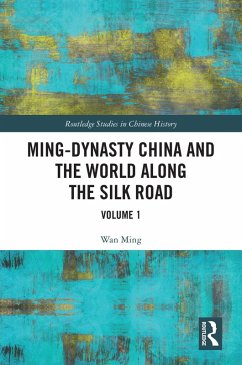
The Dong World and Imperial China's Southwest Silk Road (eBook, ePUB)
Trade, Security, and State Formation
Versandkostenfrei!
Sofort per Download lieferbar
25,95 €
inkl. MwSt.
Weitere Ausgaben:

PAYBACK Punkte
13 °P sammeln!
Brings a borderlands perspective to the history of ChinaFrom the eighth to thirteenth centuries along China's rugged southern periphery, trade in tribute articles and an interregional horse market thrived. These ties dramatically affected imperial China's relations with the emerging kingdoms in its borderlands. Local chiefs before the tenth century had considered the control of such contacts an important aspect of their political authority. Rulers and high officials at the Chinese court valued commerce in the region, where rare commodities could be obtained and vassal kingdoms showed less bell...
Brings a borderlands perspective to the history of China
From the eighth to thirteenth centuries along China's rugged southern periphery, trade in tribute articles and an interregional horse market thrived. These ties dramatically affected imperial China's relations with the emerging kingdoms in its borderlands. Local chiefs before the tenth century had considered the control of such contacts an important aspect of their political authority. Rulers and high officials at the Chinese court valued commerce in the region, where rare commodities could be obtained and vassal kingdoms showed less belligerence than did northern ones. Trade routes along this Southwest Silk Road traverse the homelands of numerous non-Han peoples.
This book investigates the principalities, chiefdoms, and market nodes that emerged and flourished in the network of routes that passed through what James A. Anderson calls the "Dong world," a collection of Tai-speaking polities in upland valleys. The process of state formation that arose through trade coincided with the differentiation of peoples who were later labeled as distinct ethnicities. Exploration of this formative period at the nexus of the Chinese empire, the Dali kingdom, and the Vietnamese kingdom reveals a nuanced picture of the Chinese province of Yunnan and its southern neighbors preceding Mongol efforts to impose a new administrative order in the region. These communities shared a regional identity and a lively history of interaction well before northern occupiers classified its inhabitants as "national minorities" of China.
From the eighth to thirteenth centuries along China's rugged southern periphery, trade in tribute articles and an interregional horse market thrived. These ties dramatically affected imperial China's relations with the emerging kingdoms in its borderlands. Local chiefs before the tenth century had considered the control of such contacts an important aspect of their political authority. Rulers and high officials at the Chinese court valued commerce in the region, where rare commodities could be obtained and vassal kingdoms showed less belligerence than did northern ones. Trade routes along this Southwest Silk Road traverse the homelands of numerous non-Han peoples.
This book investigates the principalities, chiefdoms, and market nodes that emerged and flourished in the network of routes that passed through what James A. Anderson calls the "Dong world," a collection of Tai-speaking polities in upland valleys. The process of state formation that arose through trade coincided with the differentiation of peoples who were later labeled as distinct ethnicities. Exploration of this formative period at the nexus of the Chinese empire, the Dali kingdom, and the Vietnamese kingdom reveals a nuanced picture of the Chinese province of Yunnan and its southern neighbors preceding Mongol efforts to impose a new administrative order in the region. These communities shared a regional identity and a lively history of interaction well before northern occupiers classified its inhabitants as "national minorities" of China.
Dieser Download kann aus rechtlichen Gründen nur mit Rechnungsadresse in A, D ausgeliefert werden.













